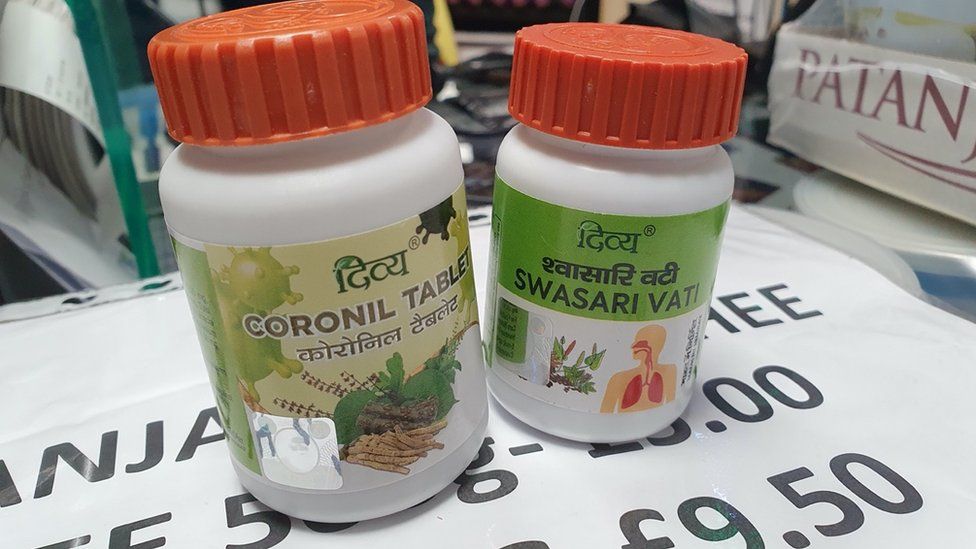Coronavirus: The misleading claims about an Indian remedy
- Published

A controversial herbal concoction has been in the news again in India, with renewed claims that it is effective against coronavirus.
The substance, called Coronil, was launched recently at an event attended by some Indian government ministers.
But there is no evidence that it works, and misleading claims have been made about approval for its use.
What do we know about the substance?
It's a combination of herbs used in traditional Indian medicine and sold by Patanjali, a big consumer goods company in India, under the name of Coronil.
It first appeared in June last year, promoted by popular yoga guru Baba Ramdev, and described - without any basis - as a "cure" for Covid-19.
But marketing had to stop after an intervention by the Indian government, which said there was no data to show it worked as a treatment.
However, the government said it could continue to be sold as "an immunity booster".
On 19 February this year, the company held another event - with Health Minister Dr Harsh Vardhan present - at which claims were repeated that it could prevent and treat Covid-19.
Dr Vardhan's presence attracted criticism from India's largest doctors' body, the Indian Medical Association.
They described the promotion of an "unscientific medicine" in the presence of the health minister as an "insult to the people of India", and asked the minister to clarify whether he supported it as a cure.
We contacted the health ministry to ask about Dr Vardhan's presence at the event, but had not received a response by the time of publication.
The Patanjali company defended the minister's attendance, saying "he neither endorsed ayurveda [India's traditional medicine], nor undermined modern medicine".
What are the claims made about Coronil?
The company continues to insist its product works against Covid-19.
"It has treated and cured people," Acharya Balkrishna, managing director of Patanjali told the BBC.
It referred us to scientific trials, the results of which it says have been published in several peer-reviewed journals.
It pointed specifically to a study from November 2020 in a journal published by the Swiss-based MDPI, which was based on a laboratory trial.
However, this study was conducted on fish, and it does not state there was evidence Coronil could cure coronavirus in humans.
It said only that the "results obtained from the present pre-clinical study warrant detailed clinical trials in humans".
Dr Michael Head, an expert on global health at the University of Southampton in the UK, told the BBC there was a huge difference between doing pre-clinical trials in the lab, and getting regulatory approval for something that works in humans.
"Many medicines show some potential promise in the laboratory, but when trialled in humans, they simply don't work for a variety of reasons," he says.
A human trial was conducted between May and June last year, on 95 patients who had tested positive for coronavirus.
Of these, 45 received the treatment and 50 were part of a placebo group (who didn't receive anything).
The Patanjali company pointed out the results have appeared in a peer-reviewed journal called Science Direct.
It said there were faster recovery rates among those who were given Coronil than those who were not.
However, this was a pilot study with a small sample size.
This can make it difficult to draw firm conclusions, as the difference in recovery rates could have been down to other factors.
Has Coronil received official approval?
In December 2020, the Patanjali company, which is based in Uttarakhand state, asked the state authorities to change Coronil's existing licence from an "immunity booster" to one for "medicine for Covid-19".
In January this year, the Patanjali company said the product had got approval - as a "supporting measure" against Covid.
The Indian ministry for traditional medicine (known as AYUSH) and the Uttarakhand state authorities both confirmed to the BBC that a new licence had been issued, but both made clear that it was "not as a cure" for Covid.
"The upgraded licence means it can be sold like zinc, vitamin C, multi-vitamins or any other supplemental medicines," said Dr YS Rawat, director of the Uttarakhand traditional medicine department and the state licensing authority.
"It [Coronil] is not a cure," he added.
The company also points to the fact that it's got a Good Manufacturing Practice (GMP) certificate, which it says is "in line with World Health Organization (WHO) certification schemes".
Rakesh Mittal, a senior executive, even claimed in a tweet that Coronil had been "recognised by the WHO", a statement he then deleted.
The GMP certification is from India's top drug regulator - under a World Health Organization (WHO)-recognised scheme - and is to ensure production standards for export purposes.
"A GMP certificate has nothing to do with the efficacy of a medicine, it is to maintain standards of quality when manufacturing," Dr Rawat from the Uttarakhand state government explained.
The WHO confirmed to the BBC that they have "not... certified the effectiveness of any traditional medicine for the treatment of Covid-19".
Dr Head, of Southampton University, says: "There is no clear evidence right now that this product is beneficial for treating or preventing Covid-19."